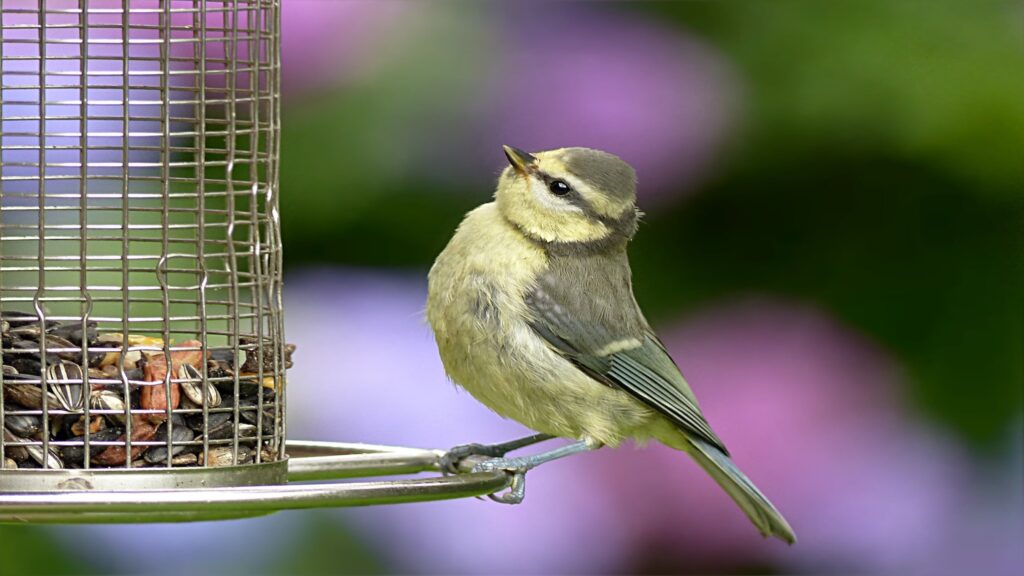
The nutritional benefits of organic food have been called into question by new research which shows wild garden birds prefer conventional seed to that which has been organically- grown.
A three-year study by Newcastle University has found that wild birds are not swayed by the organic label, but instead prefer the more protein-rich, conventional food that will help them to survive the winter.
Published in the Journal of the Science of Food and Agriculture, lead researcher Dr Ailsa McKenzie said the findings were likely to be of “considerable interest to the general public in the debate over the relative merits of consuming organic food.”
“Our results suggest that the current dogma that organic food is preferred to conventional food may not always be true,” explains Dr McKenzie, based in the School of Biology at Newcastle University.
“Protein is an essential nutrient in the diet of all birds and mammals and getting enough of it — especially in winter — can be hard.
“We showed that when given free choice, wild birds opt for the conventional food over the organic, and the most likely explanation is its higher protein content.
“This study is only looking at one aspect of the organic food debate — it does not take into account the long-term health implications of using chemical fertilizers and pesticides, or the often negative environmental impact of conventional farming; for example, other work has shown that pesticides can strongly reduce availability of seeds for birds.
“But it does raise questions about the nutritional benefits of organic food and what consumers are being led to believe.”
Global demand for organic produce is increasing by £4billion annually — the organic market now accounts for between two and three per cent of all food purchased in Europe and the USA.
One key reason why consumers buy organic food is because they consider it to be better for human and animal health. While this may indeed be the case, these are not necessarily the only factors governing food choice in animals and birds.
To carry out the study the Newcastle team set up feeding stations in more than 30 gardens across the North of England. Organic and non-organic wheat seeds (both of the same variety) were placed in adjacent bird feeders and then the rate at which the birds ate the different seeds was monitored over a six week period.
Half way through the experiment the feeders were swapped around. The experiment was repeated in a second winter with different wheat samples.
The birds showed a strong preference for the conventional seed, eating significantly more of this than the organic. When the feeder positions were switched, the birds ‘learnt’ the new position of the conventional seed and continued to select it in preference to the organic.
Analysis of the wheat found the conventionally-grown seeds to have an average 10 per cent higher protein content than the organic seeds. Other differences between the samples (e.g. in mycotoxin levels, grain size, energy content or pesticide residues) could not explain the preferences shown by the birds.
The garden bird work was confirmed by laboratory studies on canaries, also showing a significant preference for conventionally- over organically-grown seeds.
Dr McKenzie explained: “Conventionally-grown crops tend to contain significantly higher levels of protein than those grown organically due to the application of inorganic nitrogen fertilisers in conventional farming systems.
“This makes our findings potentially applicable across many food types and suggests the issues surrounding organic food are not as cut and dried as some might think.”
 Neem Oil: Your Natural Shield for Thriving Indoor Plants – A Complete Guide to Pest Protection
Neem Oil: Your Natural Shield for Thriving Indoor Plants – A Complete Guide to Pest Protection Blood Sugar Stability the Organic Way: Low-Glycemic Foods and Meal Ideas
Blood Sugar Stability the Organic Way: Low-Glycemic Foods and Meal Ideas How to Build a Fully Organic Pantry on a Budget: Essentials for Beginners
How to Build a Fully Organic Pantry on a Budget: Essentials for Beginners 10 Nutrient-Dense Organic Foods to Boost Your Energy Without Caffeine
10 Nutrient-Dense Organic Foods to Boost Your Energy Without Caffeine